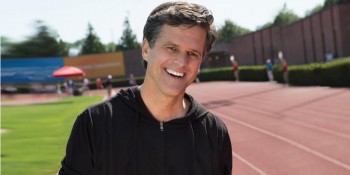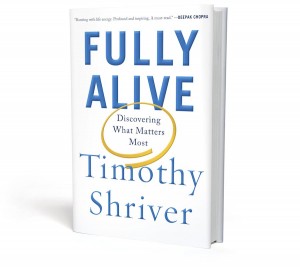 Throughout history, people with intellectual disabilities like Down Syndrome have often been shunned by society and even violently abused. But Special Olympics’ Chairman Tim Shriver has found that the young people he’s worked with have been his greatest teachers because of their kindness, wisdom, determination, and inherent dignity. His interest in intellectual disabilities stems partly from the fact that his mother, Eunice Kennedy Shriver, founded Special Olympics because of her sister Rosemary’s affliction.
Throughout history, people with intellectual disabilities like Down Syndrome have often been shunned by society and even violently abused. But Special Olympics’ Chairman Tim Shriver has found that the young people he’s worked with have been his greatest teachers because of their kindness, wisdom, determination, and inherent dignity. His interest in intellectual disabilities stems partly from the fact that his mother, Eunice Kennedy Shriver, founded Special Olympics because of her sister Rosemary’s affliction.
Tim joined me recently on “Christopher Closeup” to discuss his book “Fully Alive: Discovering What Matters Most.” Here are some excerpts:
Tony Rossi: What do you think makes the stories and the wisdom in “Fully Alive” so relevant to the world we’re living in right now?
Tim Shriver: In my own life, especially in my 20s and 30s, I was very confused about my place in the world, how to make a difference…how to make sense of my faith journey and match that to my work journey. How do you find role models who will tell you how to integrate your spiritual questions with your day-to-day questions? I came shockingly to the conclusion that most of the people I thought of as role models had very little value in that regard. The people who are cultural role models – celebrities, Nobel Prize Winners, CEOs, politicians, talking heads – they really weren’t giving me anything.
I found [answers]…in the insights of centering prayer, in the great and long tradition in Christianity [and] other traditions [that teach] the power of silence, the therapy of the soul that comes through silence. [Then] I could actually see more clearly the gifts of my fellow human beings, who often were seen by the culture as being disabled or deformed or invalid. All of a sudden, my eyes started to open up, and I began to have great moments of fulfillment and light and happiness and laughter in their presence. I decided I needed to write down how they had gifted me with this sense of purpose and calm. I no longer felt that I was going to church on Sunday and then living a different life on Monday. I felt like I’d finally found my way to those people and I wanted to share their story in a way that would help others, too.
TR: Early in “Fully Alive,” you cite St. Bernard of Clairvaux, who lived in the 11th and 12th centuries. What was it about him and his example that made him relevant to the story you’re telling in this book?
Tim Shriver: In his time, he thought that the culture needed schools of the heart. He thought to himself, “There’s no place in this culture where we actually educate men and women about their own hearts, and about their shared heart.” He created monasteries that, on the one hand, looked quite severe, [with their] self-denial, sacrifices, and self-emptying practices. But really, his animating principle [was to] lure people into their own beautiful hearts. I found that very resonant, both the tradition he started, the Cistercians, who have given so much to the world…but also his insight, which was that we need in our own time to create schools of the heart where people can feel like their hearts are being drawn out, opened, and allowed to become more fully alive. In people with intellectual disabilities, I found a school of the heart, much like the one he thought he could create for his time.
TR: You repeatedly come back to the theme that people with intellectual disabilities have been your teachers. Do you remember the first time you realized that truth? Was there a particular person who opened you to that idea?
Tim Shriver: Loretta Claiborne is a young woman who was born into the housing projects of York, PA, one of eight children, no money, born unable to walk, blind almost, with an intellectual disability. She emerges from that experience hardened. Her mother took her to an institution, but didn’t leave her there. She brought her home and educated her in the public schools in York. She was beaten up, chased, and mocked. [But when] she got involved in [Special Olympics], it was an epiphany for her. She all of a sudden saw that she had gifts, and that she could share those gifts with people who trusted and cared about her.
I met her when I was in my thirties, but she charged into the world of my work world and started staying with our family, Linda’s and my family and our children. And she had the capacity with such extraordinary genuineness to see to the heart of things. I realized I’m not here to help Loretta Claiborne. Loretta Claiborne is here as a prophet almost, as a spiritual coach for me! And that began what’s been a twenty-five year long friendship.
I started to realize that role modeling and insight and wisdom didn’t have to come from the places I thought they had to come from – from the people at Yale University, which was around the corner, or the people in governor’s offices. These are good people, don’t get me wrong! It’s just that we tend to think that they’re the smart ones. What I learned was, they’re not the only smart ones. There’s a lot of other people.
TR: We believe as Christians that every person is created in the image and likeness of God. So what have the athletes you’ve gotten to know through Special Olympics taught you about what God is really like?
Tim Shriver: God is small, tender, light. God is beautiful, universal, unconditional always. I learned that I had to learn God, not earn God. Learning God was doing less, being quieter, more patient, more vulnerable. Learning God was recognizing that God was already there, and it was my job to welcome God, not to go out and look for God.
People with intellectual and developmental differences became for me the teachers of relationship, helping me to adopt a believer’s mind, not just a thinker’s mind. A believer’s mind is someone who is in love with the world. One of the etymologies of ‘belief’ is to be in love. I’m a very unfinished product when it comes to faith. I think we all are. They continue to help me adopt that believer’s mind and learn the presence of God always and in all things.
TR: When I was growing up, the TV show “Life Goes On” was on, which starred Chris Burke, who had Down syndrome. It showed me that this person can have a fairly normal life. You’ve also been involved in film producing. What role do you think popular culture can and should play in exposing the world to people with intellectual disabilities?
Tim Shriver: Television, social media, radio, film, music, and entertainment have an enormous role in cultivating expectations, norms, patterns of behavior. Sometimes they’re terrific; sometimes they’re terrible! Sometimes they create anxiety in young people. They create expectations of unlicensed sexual behavior, of drug use, of materialism, of greed, of fierce competition. And other times, they create the opposite.
So we can’t pretend that giving a good homily, or building a pretty church, or writing a prayer book is enough anymore. It isn’t. Those things are critically important, but those things have to be brought out into popular venues, where large numbers of people can have access to them. It’s no good to know that we have a great resource in St. Teresa of Avila or in the desert mothers and fathers, and no one knows who they are, not even the people in the churches. So how do we get them out?
The same thing is true of people with intellectual differences. And there are other marginalized groups: people with mental illness, people who are homeless. These are people that we are still afraid of, we still stigmatize. We still fear admitting our own mental challenges, emotional challenges, fears, anxieties, depressions. Popular culture needs to put these things at the center of a normal life. A normal life includes depression and anxiety. A normal life includes moments of light and fulfillment. A normal life includes moments of illness and decline. A normal life includes moments of strength and care.
So you’re right, Chris Burke did great work in getting a person with Down syndrome visible, but we need these models all over our popular culture. We need to see them in our churches. We need to see men and women with intellectual differences in multiple roles, not just in service roles and not just attending, but teaching in our churches. How many churches in the United States have a person with Down syndrome who’s a teacher? And what a tremendous loss that the answer to that is probably zero? Imagine what we’re missing! And imagine if Jesus walked in and said, “What do you mean your only teachers are people who have college degrees? When did I ever say that? Where did you read that in the Gospel? How did you miss the point?”
TR: What you’ve done with this book that is also a real service is that you write about how people with intellectual differences have been maltreated throughout history. I was actually shocked by some of the stuff people said. Even Aristotle, who is generally thought of as a great thinker, you quote him as saying, “Let there be a law that no deformed child shall live.”
Tim Shriver: What we don’t realize is that 2, 3, 4 % of our brothers and sisters alive on the planet today have an intellectual disability. That’s somewhere between 2, 3, 400 million people…The reason they’re hidden is that because for thousands of years – whether it’s the legacy of the Greeks or the great civilizations of the East or the Biblical texts that have been misread [about] people with disabilities [being] demoniacs, possessed, flawed, or broken – we have pushed these people away. We have murdered them. We have experimented on them. We have locked them up. We have beaten them. And it’s true across all cultures so nobody gets a free pass here. We still have to struggle to actually come to the insight you said earlier, which is everybody has the same amount of value and importance in the eyes of God. That means everyone has the same amount of importance in our eyes, because God has no eyes on Earth today but ours. And the ideal that we as faithful people, whatever our religious traditions, believe that everyone has equal value, we are far from living it. And I mean me, Tim Shriver, remains far from living it.
The horrible treatment during the Holocaust, and the ramp ups before the Holocaust in institutions in the United States, the Supreme Court validating the need to sterilize against their will people with intellectual disabilities in institutions. The medical experimentations that let loose in the early part of the twentieth century, the horrific treatment in institutions, thousands upon thousands of people living in cribs, on stone floors without care, without love, without sometimes food and clothing. It is a horror story that is ours. I only bring it up because I think it’s important to recognize how afraid we are of being different and how much we run, as individuals and as a culture, away from that difference. Yet, how fulfilling it can be to welcome it!
TR: I want to touch on one of the pictures in your book. You took one with the Special Olympics floor hockey team from Afghanistan, and you write that they have “withstood a lot of adversity to participate in the Special Olympics.” What is the state of Special Olympics in war-torn countries like Afghanistan, and how do these young people fit into society there?
Tim Shriver: In a place like Afghanistan, we’ve had attacks on our program. We had one of our buses bombed because, in some situations, we include girls in the program – and in other situations, it’s because people have antiquated beliefs that [those with intellectual differences] ought to be excluded. But look, when you’ve got cultures and countries that have become so profoundly harmed by war, it’s tough for everybody. But there they stand. Their coaches risk their lives. They do it not for money. They go to institutions and orphanages where there’s frequently no heating systems, no cooking systems. They come and bring soccer balls, and they bring joy and excitement, and they say “Come on out. We’re gonna have games. We’re gonna show your parents that you’ve got gifts.” And it’s amazing what the human spirit unleashed from fear will do. Those are modern day saints. They’re not headline saints, but they’re saints in the sense that they follow what I see as God’s invitation to be unafraid to love without boundaries.
 TR: In our final minute, what do you hope people who read “Fully Alive” come away from it with?
TR: In our final minute, what do you hope people who read “Fully Alive” come away from it with?
Tim Shriver: I hope that they come away with some sense that they themselves have a way of living “fully alive.” I hope they are awakened to the search within as well as the search without, that they can put their inner lives and their work lives together and lead a much more fulfilling, recklessly hopeful, loving life. I hope they fall in love in some ways with God, with all things. It’s maybe audacious for me to think that a book can do that, but the only reason I have the audacity to hope that is because I think the human beings in the book are so good at teaching that lesson.
(To listen to my full interview with Tim Shriver, click on the podcast link):
















